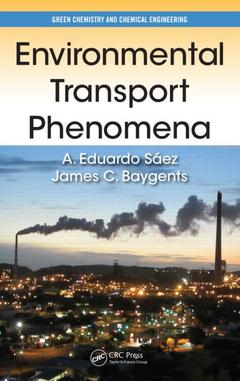Description
Environmental Transport Phenomena
Green Chemistry and Chemical Engineering Series
Language: English
Subjects for Environmental Transport Phenomena:
Keywords
Mole Fraction Profile; Dissolution Flux; Hydrodynamic Dispersion; Average Dimensionless Concentration; Diffusion Equation; Convective Mass Transfer Coefficient; Mass Balances; Limiting Rate Step; Mass Conservation; Molar Flux; Multiphase Systems; Convective Mass Transfer; Convective Transport; Macroscopic Mass Balance; Reactive Systems; Thiele Modulus; Diffusive Transport; Arbitrary Volume; Macroscopic Mass Balances; Shear Stress Profiles; Transport Phenomena Problems; Mass Transfer Coefficient; Flame Retardant; Control Volume; Mass Transfer; Mole Balance; Total Mass; Mass Balance; Mass Transfer Biot Number; Porous Medium; Passive Dispersion; Effective Diffusivity Tensor; Steady State Concentration Profile; Peak Elution Time; Average Normal Velocity
244 p. · 15.6x23.4 cm · Hardback
Description
/li>Contents
/li>Readership
/li>Biography
/li>
Environmental Transport Phenomena offers a detailed yet accessible introduction to transport phenomena. It begins by explaining the underlying principles and mechanisms that govern mass transport and continues by tackling practical problems spanning all subdisciplines of environmental science and chemical engineering.
Assuming some knowledge of ordinary differential equations and a familiarity with basic applications of fluid mechanics, this classroom-tested text:
- Addresses mass conservation and macroscopic mass balances, placing a special emphasis on applications to environmental processes
- Covers the fundamentals of diffusive transport, applications of the diffusion equation, and diffusive transport in reactive systems
- Discusses convective transport, hydrodynamic dispersion, and transport in multiphase systems
- Presents a mathematical framework for formulating and solving transport phenomena problems
Environmental Transport Phenomena makes an ideal textbook for a one-semester advanced undergraduate or graduate introductory course in transport phenomena. It provides a fundamental understanding of how to quantify the spread and distribution of contaminants in the environment as well as the basis for designing processes related to water purification, wastewater treatment, and solid waste disposal, among others.
Introduction. Mass Conservation and Macroscopic Mass Balances. Diffusive Transport: Introductory Concepts. Diffusive Transport: Applications of the Diffusion Equation. Diffusive Transport in Reactive Systems. Convective Transport. Hydrodynamic Dispersion. Transport in Multiphase Systems.
A. Eduardo Sáez is a distinguished professor in the Department of Chemical and Environmental Engineering and an adjunct professor in the Mel and Enid Zuckerman College of Public Health at the University of Arizona, Tucson, USA. He holds a B.Sc from Simón Bolívar University, Caracas, Venezuela, and an MS and Ph.D from the University of California at Davis, USA. Dr. Sáez has been a faculty member at Simón Bolívar University and North Carolina State University, Raleigh, USA, and a visiting scholar at Bristol University, UK, and Pacific Northwest National Laboratory, Richland, Washington. He has earned numerous awards for his research and teaching.
James C. Baygents is the associate dean for academic affairs in the College of Engineering at the University of Arizona (UA), Tucson, USA. He is also a member of the Department of Chemical and Environmental Engineering and the Program in Applied Mathematics at UA. He holds a BS from Rice University, Houston, Texas, USA, and an MA and Ph.D from Princeton University, New Jersey, USA. Dr. Baygents has been a visiting scientist and research fellow at the Space Science Laboratory at the NASA Marshall Space Flight Center, Huntsville, Alabama. He has earned numerous awards and received recognition for his research and teaching.




